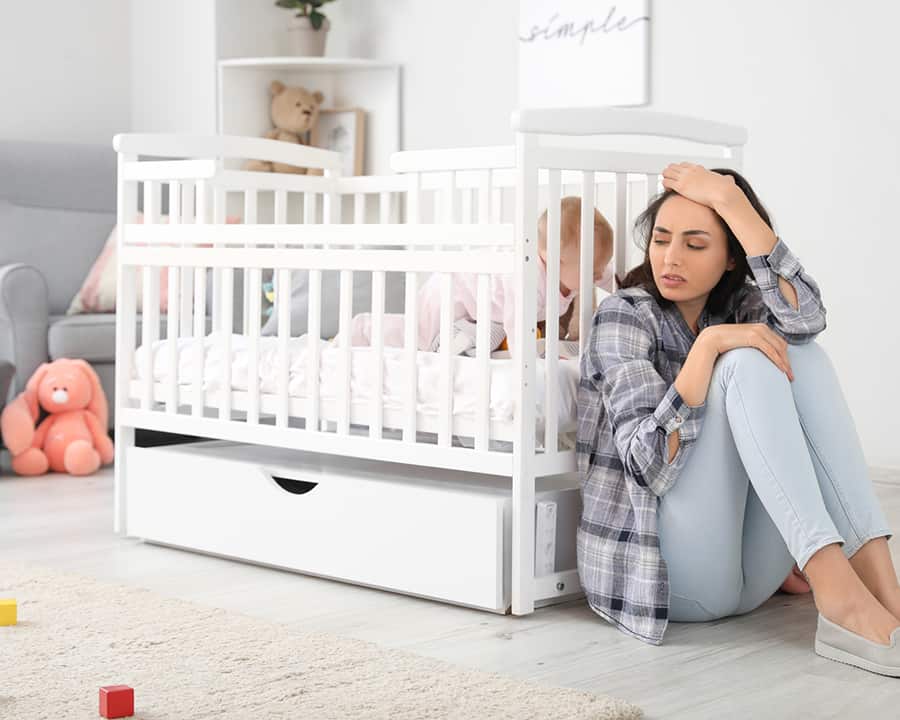Do you (or someone you love) feel overwhelmed, anxious, or depressed after giving birth?
If so, it could be an early indication that you may be experiencing a mental health condition called postpartum depression (PPD). Postpartum depression affects nearly one in seven mothers, and it can be a debilitating condition that takes a toll on both you and your family. This type of depression ranges from mild to severe and has a significant impact on new mothers. The transition into motherhood can be a rollercoaster ride, with powerful emotions that come into play. You are reborn into a different person as your baby leaves your womb and makes their arrival into the big wide world. Although it’s common to feel overwhelmed or anxious, if these feelings continue for more than seven days and start to interfere with daily life, it’s important to get help. With the right treatment, PPD is a manageable condition, and seeking help can make all the difference. Don’t suffer in silence – reach out for support. Getting help is a sign of strength. It’s not a weakness, and taking care of yourself is essential to being the best mother you can be for your baby.
But what exactly causes postpartum depression? Do all women get it, and what can you do about it?
More Blogs From Nancy Branberg
Can You Prevent Postpartum Preeclampsia?
Postpartum: Here’s What Really May Happen After You’ve Had Your Baby
Physical Therapist Falls Church Virginia
What Is Postpartum Depression?
For many new mothers, the birth of their baby is an amazing occasion filled with excitement and anticipation. Some women describe the rush of oxytocin that occurs as the baby leaves the birth canal as being like “fireworks going off in their head.” Nothing comes close.
However, for some women, the time after the birth “postpartum” can bring about a complex set of feelings and emotions that can severely affect their mood and mental health and ability to bond with their new baby. Doctors call this condition “postpartum depression”.
Postpartum depression is a clinical form of depression that occurs after childbirth. The symptoms associated with this condition can range from feelings of intense sadness and anxiety to irritability and difficulty sleeping. You may also experience a loss of interest in activities you used to enjoy, fatigue, relationship problems and or breakdown, and even thoughts of harming yourself or your newborn.
The transition into motherhood is an exciting time. However, it can also present physical and emotional challenges. “Postpartum,” or the period following childbirth, can significantly impact your well-being. With the sudden surge of or drop in hormones, physical exhaustion, and the emotional rollercoaster of the inexplicable love and joy juxtaposed with the inescapable burden of responsibility for a tiny, helpless human being that relies on you for EVERYTHING, it’s not surprising that stress and depression are common occurrences after childbirth.
Physically, your body undergoes numerous changes, too, from hormone fluctuations, new skin texture, and lumps and bumps where you didn’t have them before to scar tissue and healing from the physical trauma of the birth. Plus, when your milk comes in, your breasts can sometimes swell to three times their normal size and become incredibly sore and painful. It’s a lot to endure. It’s also magical that our bodies are capable of such an amazing feat – to birth and feed brand-new human beings.
But when the pain-relieving high of seeing and holding your baby for the first time dissipates, these immense physical changes can cause pain and discomfort, fatigue, and perhaps most importantly when it comes to mental health – sleep disturbances and insomnia.
Emotionally, you may feel anxious and/or depressed, tense and disassociated, which can manifest as feelings of sadness, hopelessness, and irritability. You may also emotionally struggle to accept the changes in your body. You may have sustained injuries to your bladder and/or pelvic floor, resulting in incontinence or other embarrassing symptoms. Some women also experience a traumatic birth, which can have long-lasting emotional effects and PTSD. You may feel fiercely protective over your precious new baby, too – unable to let them out of your sight and worried that they will come to some harm.
That’s why it’s so important to prioritize self-care during this time and accept support from loved ones and healthcare professionals. Just remember that with the right care and attention – and support from friends and family, you can navigate the challenges of the postpartum period and emerge stronger and more resilient.
The good news is that although postpartum depression can be overwhelming, there are many different types of treatment available if you are struggling with poor mental health after the birth of your baby. One of the most common and effective treatments for PPD is talk therapy, a form of counseling that involves discussing your thoughts and feelings with a professional. Sometimes, this is enough to lift the feelings of depression just by getting some of the heavy feelings off your chest.
A more specific type of talking therapy called Cognitive Behavioural Therapy (CBT) can be especially helpful in changing unhealthy thought patterns and behaviors that might be contributing to your postpartum depression. It’s also a helpful way to learn new coping strategies to minimize stress and anxiety and reduce the severity of PPD symptoms.
Another helpful form of treatment is alternative therapies like acupuncture or massage therapy – they can greatly reduce stress and anxiety levels, allowing your nervous system to rest and recalibrate. Lastly, medications like antidepressants can sometimes help to regulate the chemicals in your brain and nervous system that affect your mood, providing relief from more severe symptoms. However, we recommend that you only use them for a short period.

Taking care of yourself now makes it easier to adjust to the next phase and continue providing love and support to your baby without the added stress of untreated postpartum blues.
Developing an action plan to address postpartum depression can be an empowering step toward achieving balance and well-being. Working with specialist women’s healthcare providers and identifying personalized strategies for self-care and support can help you navigate this challenging time and equip you with the tools you need to become stronger and happier than before.
Becoming a mother is one of the most significant milestones in your life. But this emotional rollercoaster can be especially hard for first-time mothers adjusting to their new role. It’s essential to understand that experiencing new emotions is normal and should not be seen as a sign of weakness. Some of the most common emotions new mothers feel include anxiety, guilt, and fear. You’re not alone.
That’s why it’s crucial to establish a support system of friends and family who can encourage you. Talking to other mothers can also be incredibly helpful. Don’t worry, your emotions will stabilize, and you can enjoy this wonderful time. There is no shame in asking for assistance during this challenging time. Getting the support you need can make all the difference in your recovery.
Do you know the signs of postpartum depression? If you’re a new mom feeling overwhelmed and not quite sure what to look out for, it’s crucial that you recognize the early symptoms because this condition can be serious if left untreated. Being aware of the possible warning signs associated with PPD is a really good idea so that you can promptly seek help before your mental health deteriorates.
The most common early warning signs of postpartum depression (PPD) include:
- Sadness
- Hopelessness
- Irritability that persists for extended periods
- Difficulty bonding with your baby
- Changes in appetite or sleep patterns
*In severe cases, if postpartum depression is left untreated, it can lead to postpartum psychosis or thoughts of harming yourself or the baby.
How To Spot The Early Warning Signs Of Postpartum Depression
If you are worried that your partner, sister, or another woman you love may have postpartum depression, it’s important to recognize both verbal and non-verbal cues that suggest they may be struggling. When engaging with them, pay attention to their body language. Do they appear tense, withdrawn, or uninterested in interacting with their baby or anyone else?
Verbal cues to watch out for include expressing feelings of hopelessness, guilt, or sadness, talking about being a bad parent or even making references to suicide. In these cases, it’s crucial to encourage seeking professional help and offer your support during this challenging time.
More Help…
The American Psychological Association provides an informative overview of postpartum depression on its website, including risk factors, symptoms, and effective treatment options. The Postpartum Support International organization also offers a wealth of resources for new moms, including a free, confidential helpline and online support groups.
Your healthcare provider or local hospital may also have additional resources available.



